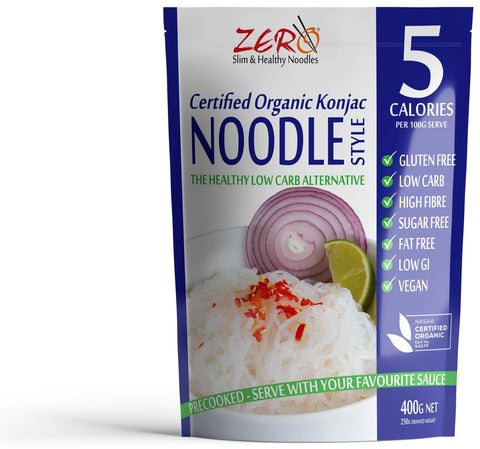Here's Why Weight Loss Is 80 Percent Diet And 20 Percent Exercise
You may have heard so-called experts say that successful weight loss is about 90 percent diet and 20 percent exercise, but what does this really mean? And, most importantly, what does it mean for you and your weight loss or weight management goals?
Is diet more important than exercise?

It is now generally agreed that diet will always play a more important role in weight loss than exercise. This is where the 80 percent comes from and is why more and more people are carefully considering their food intake and also turning to foods such as our Zero Noodles and Zero Rice. But what are the key points when it comes to modifying your diet to achieve weight loss?

In simple terms, it is all about achieving the all-important negative balance. This essentially means consuming fewer calories than you burn. To lose one pound, you need to get to a 3,500-calorie deficit. This means that you need to have taken in 3,500 less calories than you burned.
If you want to achieve this using the 80/20 formula mentioned previously, you need to be looking at reducing your dietary intake by around 3,000 calories and burning off around 750 through exercise. It is reasonable to think that you could lose a pound in a week - or even over a five-day period - and so this could mean burning off 250 calories through exercise three times a week and achieving a calorie deficit of 600 calories on each of these five days. Of course, weight loss isn’t an exact science, so you cannot always predict exactly how many calories you consume, work off and need to reduce in order to lose weight, but it does give you a general idea of how it could work.
Why is dieting more effective than doing exercise?
The reason that what you eat is more important than how much you exercise and what you do if you are trying to lose weight is largely due to the fact that it is extremely difficult to burn calories through exercise. It is far easier to create the essential calorie deficit needed to lose weight by reducing what you eat rather than trying to burn the weight off in the gym.
It would take a huge amount of activity if you wanted to create the 500 to 700 calorie deficit per day that you would need to just lose a pound a week. In fact, you would have to run between seven and ten miles each day in order to get near to this goal just through exercise alone.
Exercise more and eat more

To add insult to injury, if you were one of the rare people who could keep up this level of exercise in the longer term, you would probably end up eating more in order to compensate for the increased activity. In fact, it is common for people who increase their exercise to eat more and end up putting on weight rather than losing it. Of course, there are many other health benefits to exercise, such as the effects it can have on everything from cardiovascular health to mental wellbeing, but it is important to know that you shouldn’t be relying on exercise as the primary tool in your weight loss kit.
Not an exact science
In order to lose weight, you don’t need to hit the 80/20 ratio at all times, but it is really helpful in demonstrating where you should be concentrating your efforts. It is vital to always remember that you can shed weight without exercising, but you will not lose pounds if you eat more calories than you expend.
As mentioned previously, however, this is not an excuse for you to give up on your gym membership. Yes, it is far easier to get to the required calorie deficit through diet than through exercise alone, but the best weight loss plans will encompass an element of both. Using both exercise and diet will remove the need to make massive changes in your lifestyle by spreading the load when it comes to calorie burning.
For example, rather than having to run ten miles every single day, you could aim to burn 250 calories off by doing a bit of exercise a few times a week and then just forgo desserts for a while to save on the calories you consume. It is also important to combine your exercises to achieve the maximum benefits. A mix of cardiovascular and strength training will have the best outcome.